| 1 | Bukit Jalil National Stadium | 87,411 | Kuala Lumpur |  Malaysia Malaysia | 1998 Commonwealth Games, 2001 Southeast Asian Games, 2017 Southeast Asian Games | Association football |  |
| 2 | Guangdong Olympic Stadium | 80,012 [1] | Guangzhou |  China China | 2001 National Games of China, 2009 Asian Championships, 2010 Asian Games | Association football |  |
| 3 | Beijing National Stadium | 80,000 [2] | Beijing |  China China | IAAF World Challenge (IAAF World Challenge Beijing), 2008 Summer Olympics, 2015 World Championships, 2027 World Athletics Championships | Association football |  |
| 4 | National Sports Stadium | 80,000 | Harare |  Zimbabwe Zimbabwe | | Association football |  |
| 5 | Azadi Stadium | 78,166 [3] | Tehran |  Iran Iran | 1974 Asian Games | Association football |  |
| 6 | Gelora Bung Karno Stadium | 77,193 | Jakarta |  Indonesia Indonesia | 1962 Asian Games, 1985, 1995, and 2000 Asian Athletics Championships, 2018 Asian Games, 2018 Asian Para Games | Association football |  |
| 7 | Atatürk Olympic Stadium | 76,092 [4] | Istanbul |  Turkey Turkey | | Association football | 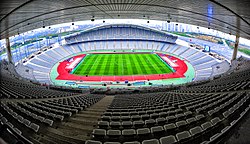 |
| 8 | Naghsh-e Jahan Stadium | 75,000 | Isfahan |  Iran Iran | | Association football | |
| 9 | Cairo International Stadium | 75,000 | Cairo |  Egypt Egypt | 1991 All-Africa Games | Association football |  |
| 10 | Stade de France | 69,000 | Saint-Denis |  France France | IAAF Diamond League (Meeting de Paris; 1999-2016), 2003 World Championships, 2024 Summer Olympics | Association football, rugby union, rugby league | 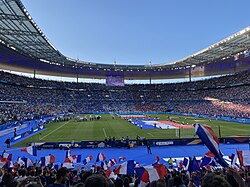 |
| 11 | Olympiastadion | 71,000 [5] | Berlin |  Germany Germany | IAAF World Challenge (ISTAF Berlin), 1936 Summer Olympics, 2009 World Championships, 2018 European Championships | Association football |  |
| 12 | International Stadium Yokohama | 72,237 | Yokohama |  Japan Japan | 2019 IAAF World Relays | Association football, rugby union |  |
| 13 | Stadio Olimpico | 67,585 [6] | Rome |  Italy Italy | IAAF Diamond League (Golden Gala), 1960 Summer Olympics, 1974, 2024 European Championships, 1975 Summer Universiade, 1987 World Championships, 2001 Summer Deaflympics | Association football |  |
| 14 | Olimpiyskiy National Sports Complex | 70,050 [7] | Kyiv |  Ukraine Ukraine | | Association football |  |
| 15 | Seoul Olympic Stadium | 60,000 | Seoul |  South Korea South Korea | 1986 Asian Games, 1988 Summer Olympics | Association football | |
| 16 | Athens Olympic Stadium | 69,618 [8] | Athens |  Greece Greece | 2004 Summer Olympics, 1982 European Championships, 1997 World Championships | Association football |  |
| 17 | Olympiastadion | 63,118 [9] | Munich |  Germany Germany | 1972 Summer Olympics, 1999 IAAF Grand Prix Final, 2002, 2022 European Championships | Association football |  |
| 18 | Estadio Olímpico Universitario | 68,954 | Mexico City |  Mexico Mexico | 1955 Pan American Games, 1968 Summer Olympics, 1975 Pan American Games, 1979 Summer Universiade | Association football |  |
| 19 | Yadegar-e Emam Stadium | 68,833 | Tabriz |  Iran Iran | | Association football | |
| 20 | Baku Olympic Stadium | 68,700 | Baku |  Azerbaijan Azerbaijan | 2015 European Games, 2017 Islamic Solidarity Games | Association football |  |
| 21 | Salt Lake Stadium | 68,000 [10] | Kolkata |  India India | 1987 South Asian Games | Association football |  |
| 22 | Japan National Stadium | 68,000 | Tokyo |  Japan Japan | 2020 Summer Olympics, 2020 Summer Paralympics | Association football, rugby union | 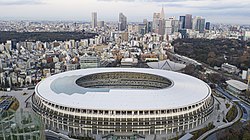 |
| 23 | Daegu Stadium | 66,422 | Daegu |  South Korea South Korea | 2003 Summer Universiade, 2011 World Championships | Association football | |
| 24 | Basra International Stadium | 65,227 | Basra |  Iraq Iraq | | Association football |  |
| 25 | Tripoli Stadium | 45,000 | Tripoli |  Libya Libya | | Association football | |
| 26 | Stade du 5 Juillet | 64,000 | Algiers |  Algeria Algeria | 1975 Mediterranean Games, 1978 All-Africa Games, 2000 African Championships in Athletics, 2004 Pan Arab Games, 2007 All-Africa Games, 2018 African Youth Games | Association football |  |
| 27 | Nanjing Olympic Sports Center | 61,443 | Nanjing |  China China | IAAF World Challenge (Nanjing World Challenge), 2005 National Games of China, 2014 Summer Youth Olympics | Association football | |
| 28 | Moshood Abiola National Stadium | 60,491 | Abuja |  Nigeria Nigeria | 2003 All-Africa Games | Association football | |
| 29 | Shenzhen Universiade Sports Centre | 60,334 | Shenzhen |  China China | 2011 Summer Universiade | Association football | |
| 30 | Jawaharlal Nehru Stadium | 58,000 [11] | Delhi |  India India | 1982 Asian Games, 2010 Commonwealth Games | Association football |  |
| 31 | Stade Olympique Hammadi Agrebi | 60,000 | Radès |  Tunisia Tunisia | 2001 Mediterranean Games | Association football | |
| 32 | National Heroes Stadium | 50,000 | Lusaka |  Zambia Zambia | | Association football |  |
| 33 | Jaber Al-Ahmad International Stadium | 60,000 | Kuwait City |  Kuwait Kuwait | | Association football | |
| 34 | Shenyang Olympic Sports Centre Stadium | 60,000 | Shenyang |  China China | 2013 National Games of China | Association football |  |
| 35 | Hefei Olympic Sports Center Stadium | 60,000 | Hefei |  China China | | Association football | |
| 36 | Guangxi Sports Center | 60,000 | Nanning |  China China | | Association football |  |
| 37 | Chongqing Olympic Sports Center | 58,860 | Chongqing |  China China | | Association football | |
| 38 | Stadio San Nicola | 58,270 | Bari |  Italy Italy | 1997 Mediterranean Games | Association football | |
| 39 | Estadio Mario Alberto Kempes | 57,000 | Córdoba |  Argentina Argentina | | Association football |  |
| 40 | Jinan Olympic Sports Center Stadium | 56,808 | Jinan |  China China | 2009 National Games of China | Association football | 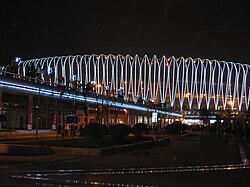 |
| 41 | Estadi Olímpic Lluís Companys | 55,926 | Barcelona |  Spain Spain | 1955 Mediterranean Games, 1998 IAAF World Cup, 1992 Summer Olympics, 2010 European Athletics Championships, 2012 World Junior Championships in Athletics | Association football |  |
| 42 | Stadion Śląski | 55,211 | Chorzów |  Poland Poland | 2021 World Athletics Relays, 2021 European Athletics Team Championships Super League, 2028 European Athletics Championships | Association football |  |
| 43 | Kasarani Stadium | 55,000 | Nairobi |  Kenya Kenya | 1987 All-Africa Games, 2017 IAAF World U18 Championships | Association football |  |
| 44 | Kaohsiung National Stadium | 55,000 | Kaohsiung |  Taiwan Taiwan | | Association football |  |
| 45 | Helong Sports Center Stadium | 55,000 | Changsha |  China China | |
| 46 | Tianhe Stadium | 54,856 | Guangzhou |  China China | 1987 National Games of China | Association football |  |
| 47 | Tianjin Olympic Center | 54,696 | Tianjin |  China China | 2017 National Games of China | Association football | |
| 48 | Boris Paichadze Stadium | 54,549 | Tbilisi |  Georgia Georgia | | Association football, rugby union |  |
| 49 | Wuhan Sports Center Stadium | 54,000 | Wuhan |  China China | 2015 Asian Athletics Championships, | Association football |  |
| 50 | Aleppo International Stadium | 53,200 | Aleppo |  Syria Syria | | Association football | |
| 51 | Rajko Mitić Stadium | 53,000 | Belgrade |  Serbia Serbia | | Association football |  |
| 52 | Yellow Dragon Sports Center | 52,672 | Hangzhou |  China China | | Association football | 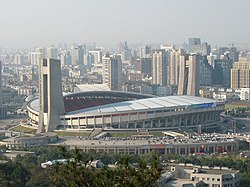 |
| 53 | Franklin Field | 52,593 | Philadelphia |  United States United States | Liberty Bell Classic, Penn Relays | American football | |
| 54 | Guiyang Olympic Sports Center | 51,638 | Guiyang |  China China | | Association football |  |
| 55 | Hohhot City Stadium | 51,632 | Hohhot |  China China | | Association football | 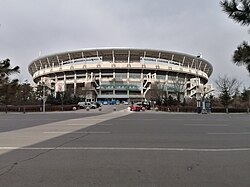 |
| 56 | Shizuoka Stadium | 50,889 | Fukuroi |  Japan Japan | | Association football, rugby union | 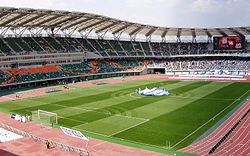 |
| 57 | Ernst Happel Stadion | 50,865 | Vienna |  Austria Austria | 1938 European Championships | Association football | 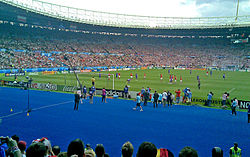 |
| 58 | King Baudouin Stadium | 50,024 | Brussels |  Belgium Belgium | IAAF Diamond League (Memorial Van Damme), 1950 European Championships | Association football | |
| 59 | Singapore National Stadium | 50,000 | Singapore |  Singapore Singapore | 2015 Southeast Asian Games | Associention football, Cricket, rugby sevens | |
| 60 | Nagai Stadium | 47,000 | Osaka |  Japan Japan | 2007 World Championships | Association football |  |
| 61 | Jiangxi Olympic Sports Center | 50,000 | Nanchang |  China China | | Association football | |
| 62 | Xinjiang Sports Centre | 48,000 | Ürümqi |  China China | | Association football | |
| 63 | Khalifa International Stadium | 45,000 | Doha |  Qatar Qatar | IAAF Diamond League (Qatar Athletic Super Grand Prix), 2006 Asian Games, 2019 Asian Championships | Association football |  |
| 64 | Pars Shiraz Stadium | 50,000 | Shiraz |  Iran Iran | | Association football |  |
| 65 | Rajamangala National Stadium | 49,722 | Bangkok |  Thailand Thailand | | Association football | |
| 66 | Camille Chamoun Sports City Stadium | 49,500 | Beirut |  Lebanon Lebanon | | Association football | |
| 67 | Miyagi Stadium | 49,133 | Rifu |  Japan Japan | | Association football |  |
| 68 | Incheon Munhak Stadium | 49,084 | Incheon |  South Korea South Korea | | Association football |  |
| 69 | Stade Mohammed V | 45,891 | Casablanca |  Morocco Morocco | 1983 Mediterranean Games | Association football | 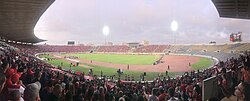 |
| 70 | Gelora Bung Tomo Stadium | 45,000 | Surabaya |  Indonesia Indonesia | | Association football |  |
| 71 | Tuanku Abdul Rahman Stadium | 45,000 | Seremban |  Malaysia Malaysia | | Association football | |
| 72 | Kobe Universiade Memorial Stadium | 45,000 | Kobe |  Japan Japan | | Association football | |